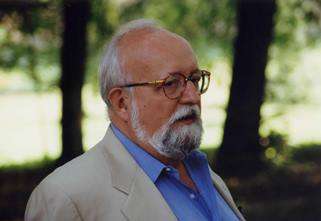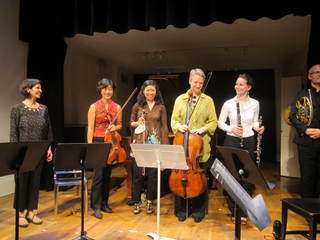|
Back
The Bewildering Beguilement of Penderecki's Universe New York
Symphony Space
10/25/2013 -
Krzysztof Penderecki: Cadenza for solo viola – String Quartet No. 3 – Capriccio per Siegfried Palm – Clarinet Quartet–Sextet
Nathan Lesser, Ari Yoshiola (Violins), Colin Brookes, Matthew Lipman (Violas), Jay Campbell (Cello), Moran Katz (Clarinet), Karl Kramer (Horn), Idith Meshulam (Piano), Penderecki String Quartet: Jeremy Bell, Jerzy Kaplanek (Violins), Christine Vlajik (Viola), Katie Schlaikjer (Cello)

K. Penderecki (© P. Anderson)
When told that I would be going to an all-Penderecki performance last night an erudite acquaintance cautioned me, “Why not? As long as the music stops in the 1970’s.”
That, as the concert of chamber music sponsored by the Polish Institute proved, was a severely biased judgment. Yes, this master of contemporary music had presented us with early masterpieces. The Threnody for the Victims of Hiroshima and the St. Luke Passion and that outrageous The Devils of Loudun are priceless. Having lived through the most tragic history of the 20th Century in a fractured Poland, Krzysztof Penderecki has composed works for the Nine-Eleven tragedy, to the victims of Auschwitz, a memorial for Pope John Paul, and other works of social significance. But he has never sacrificed the knotty aural and rhythmic complexities which arise instinctively from his great mind.
But these past 40 years have brought forth a new, even enlightened Penderecki. He has hardly ignored those tone clusters, the massive sounds and sometimes impossible challenges for musicians and audiences. But if his music isn’t “easy”, it is far from forbidding. The composer, a month from 80 years old and solemnly spry during his interviews at the concert, had never religiously followed any “school”. His five works played here had different inventions, different forms, thus always curious and surprising. And while he is known for massive orchestral and choral works, he confessed to interlocutor Helga Davis that he was now driven by chamber music.
“Not a single note can be wasted. Every note must mean something.”
Which it did in this medley of music, part solo, part ensemble, all of it played by outrageously talented, outrageously young performers.
As a string player himself, Penderecki’s two solo pieces simply ran the gamut of challenges to three players, none of whom looked over 14 years old. (Though they must have been in the 20’s).
Matthew Lipman took on a cadenza, which had been written to augment the composer’s Viola Concerto. As fiercely difficult as it could be for Mr. Lipman, it was bound for us by a simple two-note “sigh” at the beginning. And that minor-second two notes was transformed into larger and larger arches in a music without meter indication, without bar lines. The middle had almost a Baroque gigue section, but the ending came with the same sighing motif.

J. Campbell (© Beowulf Sheehan)
For sheer impossibility, Jay Campbell, unassuming, resembling a prankish schoolboy , lifted his cello and took a Capriccio written for Siegfried Palm in 1964, and played sounds never heard before. This was the early Penderecki, for whom nothing was impossible, whether hitting the fingerboard at the top and slapping the instrument or playing fast arpeggios between the bridge and the tailpiece in a whirlwind of notes.
I had previously heard Mr. Campbell playing the enigmatic music of Georg Friedrich Haas, but this was simply unbelievable. So much so that Mr. Penderecki himself stated, unequivocably, “Never have I heard this played so well.” It was not a compliment, it was the evening’s Holy Father’s non–confutable in camera pronouncement.
The other near solo piece was the Clarinet Quartet played by Eric Campbell with three players of the Yale Music School. In a way, this was the most conservative work. No overtones, no harmonics, no new notes. Mr. Penderecki had described it as the ideal chamber work: “A dinner for four, an intimate meeting of friends, each of whom has something to say, but they know each other so well that none of them has to finish".
That intimate simplicity might have been welcomed, but Penderecki is most interesting when he becomes eccentric, when he poses impossible tricks, when the aural worlds whirl around in non-Copernican ellipses of their own.
That was true in his most recent piece on the program, String Quartet No. 3 (“Leaves from an unwritten diary”). Like Janácek, Smetana and Sibelius with their autobiographical quartets, this one quotes works, but without context, simply out of nowhere, developing these motifs, going back for more in different rhythms. One is again in the Penderecki galaxy, where each of the players from the eponymous Penderecki String Quartet, starting with the mournful viola, travel through a polytonal, polyrhthmical trip to worlds unheard before. We have a nocturne, a bitter waltz, a tune which could be gypsy or Jewish (Penderecki said it was a melody which his father played, probably Rumanian). It was unsettling music, but always intriguing, sometimes bitter, always ravishing.

Pi “sextet” (© Coco T. Dog)
The final, longest work of the evening was the Sextet, which I had heard with the same players at a “Peace” concert less than two weeks ago. The performers, from the Pi Ensemble might have had difficulties linking this directly with their theme of peace. But last night nobody was looking for a theme. Instead, Penderecki himself was the theme.
Perhaps one might compare this Sextet with its Jewish shtetl music, shrieking clarinet, age-old waltzes and crashing chords, to a painting by Marc Chagall. As in Penderecki’s other chamber music, the symbols and quotes are familiar, but without definition. The dances are frenzied, the funereal sections are desolate. Yet within this not-quite describable world is a man whose mind embraces the sacred, the quirky, the forest, meadows, and yes, the serpents of a bewildering but always beguiling universe.
Harry Rolnick
|